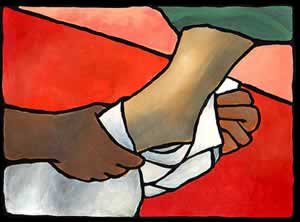From Matthew’s Gospel:
Now while Jesus was at Bethany in the house of Simon the leper, a woman came to him with an alabaster jar of very costly ointment, and she poured it on his head as he sat at the table. But when the disciples saw it, they were angry and said, “Why this waste? For this ointment could have been sold for a large sum, and the money given to the poor.” But Jesus, aware of this, said to them, “Why do you trouble the woman? She has performed a good service for me. For you always have the poor with you, but you will not always have me.”
(From the Daily Office Lectionary – Matthew 26:6-11 – July 19, 2012)
 In yesterday’s gospel lesson Jesus told the story of the king separating the righteous form wicked as a shepherd separates sheep from goats and saying “As you care for the poor, you care for me.” It reminded me of a few cogent remarks that have been made about the measure of society – From Samuel Johnson: “A decent provision for the poor is the true test of civilization.” From Mahatma Ghandi: “A nation’s greatness is measured by how it treats its weakest members.” From Franklin Delano Roosevelt: “The test of our progress is not whether we add more to the abundance of those who have much, it is whether we provide for those who have too little.”
In yesterday’s gospel lesson Jesus told the story of the king separating the righteous form wicked as a shepherd separates sheep from goats and saying “As you care for the poor, you care for me.” It reminded me of a few cogent remarks that have been made about the measure of society – From Samuel Johnson: “A decent provision for the poor is the true test of civilization.” From Mahatma Ghandi: “A nation’s greatness is measured by how it treats its weakest members.” From Franklin Delano Roosevelt: “The test of our progress is not whether we add more to the abundance of those who have much, it is whether we provide for those who have too little.”
Now is Jesus giving up? “You will always have the poor with you.” Is he saying, “No matter how much you do for the poor, it won’t be enough”? And then he says, “But you won’t always have me,” which excuses the act of costly worship performed by the unnamed woman. So fancy rituals are to be preferred to service to those in need? Is that what this means?
I think not, at least I hope not. I believe that Jesus is making reference to an observation in the Book of Deuteronomy: “Since there will never cease to be some in need on the earth, I therefore command you, ‘Open your hand to the poor and needy neighbor in your land.'” (Deut. 15:11) What appears to be going on in this incident is an illustration of timeliness and priority. Service to the poor is a constant obligation but, at that particular time and place, service to Jesus as he prepared to die took priority.
Worship and adoration of God are a priority; in fact, they may be the central priority of the church. An occasional foray into what we might call “pure” worship (the sort of ritual and ceremony Christians do on Sunday morning, for example) is certainly needed, but constant worship as an activity of everyday life is what is enjoined, constant worship in the context of constant service. “Rejoice in the Lord always; again I will say, Rejoice.” (Philip. 4:4) The key word is “always” – not just in the special moments when take time to wash and anoint his feet. We must, as Brother Lawrence admonishes, accustom ourselves to continual conversation with God; this can and should be done in all we do, especially in and during our service to poor whose feet also need washing (remember Bishop Weston’s words quoted yesterday).
Recently, I heard a preacher suggest that a way to understand Jesus’ reference to Deuteronomy, his statement that “you always have the poor with you,” is that it is with the poor that Jesus’ followers will be found; if we truly live out his gospel, we always will be found among and serving the less fortunate of society. This is as much worship as the Mass on Sunday.
So there is no real dichotomy; there was no “giving up”. There was, simply, a recognition of time and place and priority. And the statement of an unfortunate truth: we always have the poor with us.
====================
Father Funston in the rector of St. Paul’s Episcopal Church, Medina, Ohio.



Leave a Reply